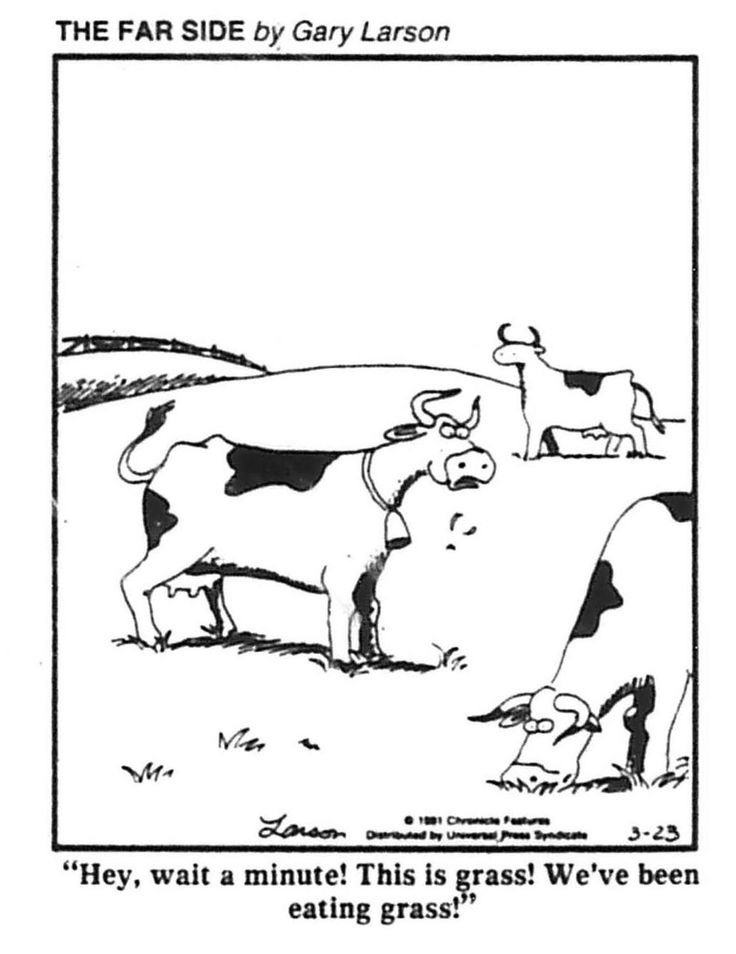when you're ready to stop eating grass

This is a kind of follow-up to my previous post, in which I described this blog as a venue for conserving and transmitting what I believe to be valuable and worthy of our attention. But I don’t want to argue with people about how they spend their time and what they devote their attention to. Now, sometimes I forget this principle and end up arguing anyway. But why would I even try to avoid it?
In 1940 C. S. Lewis gave a talk, later to be published as an essay, called “Why I Am Not a Pacifist.” Lewis begins this talk by discussing conscience, which makes sense, since pacifists often account for their position by appealing to their conscience. Their conscience tells them that fighting in a war is wrong. But to say merely this is to obscure a question that Lewis thinks important: How does one arrive at moral judgments, e.g. the judgment that fighting in a war is wrong? Lewis addresses this question by saying that arriving at judgments about right and wrong is functionally or structurally similar to arriving at judgments about truth and falsehood. So how do we do that?
Lewis says that there are three elements to “any concrete train of reasoning”:
Firstly, there is the reception of facts to reason about. These facts are received either from our own senses, or from the report of other minds; that is, either experience or authority supplies us with our material. But each man's experience is so limited that the second source is the more usual; of every hundred facts upon which to reason, ninety-nine depend on authority. Secondly, there is the direct, simple act of the mind perceiving self-evident truth, as when we see that if A and B both equal C, then they equal each other. This act I call intuition. Thirdly, there is an art or skill of arranging the facts so as to yield a series of such intuitions which linked together produce a proof of the truth or falsehood of the proposition we are considering.
Lewis is especially interested in the second step, intuition. (By the way, it is not just Lewis who uses the term in this way: he’s borrowing from Thomas Aquinas.) And one point he makes about intuition is especially important:
The second, the intuitional element, cannot be corrected if it is wrong, nor supplied if it is lacking. You can give the man new facts. You can invent a simpler proof, that is, a simpler concatenation of intuitable truths. But when you come to an absolute inability to see any one of the self-evident steps out of which the proof is built, then you can do nothing. No doubt this absolute inability is much rarer than we suppose. Every teacher knows that people are constantly protesting that they “can't see” some self-evident inference, but the supposed inability is usually a refusal to see, resulting either from some passion which wants not to see the truth in question or else from sloth which does not want to think at all. But when the inability is real, argument is at an end. You cannot produce rational intuition by argument, because argument depends upon rational intuition. Proof rests upon the unprovable which has to be just “seen.” Hence faulty intuition is incorrigible. It does not follow that it cannot be trained by practice in attention and in the mortification of disturbing passions, or corrupted by the opposite habits. But it is not amenable to correction by argument.
And as with rational intuition, so also with moral intuition. If you simply cannot see that, for instance, eating people is wrong, then no one will be able to come up with an argument to convince you. Your mind may be alterable, but not by that means.
Think about the hundreds of millions of people who spend their days shitposting; dragging political enemies on social media; writing to complete strangers to tell them that they’re stupid or evil; scrolling through TikTok for endless hours — I can’t find the link now, but one person recently reported noticing that the person sitting just in front of her on a 10-hour transoceanic flight never stopped watching TikTok for the duration —; drooling enviously over perfect Instagram lives; constantly self-diagnosing their own manifold mental illnesses; constantly pursuing their porn preferences into darker and darker places … a properly functioning intuitive faculty would tell them that all this is an absolutely shitty way to live … but their intuitive faculty is broken, or has never been developed.
You just have to wait for the moment when they realize that all this time they’ve been eating grass. And then, when that happens, you need to have something better, something that’s tastier and more nutritious, waiting for them.